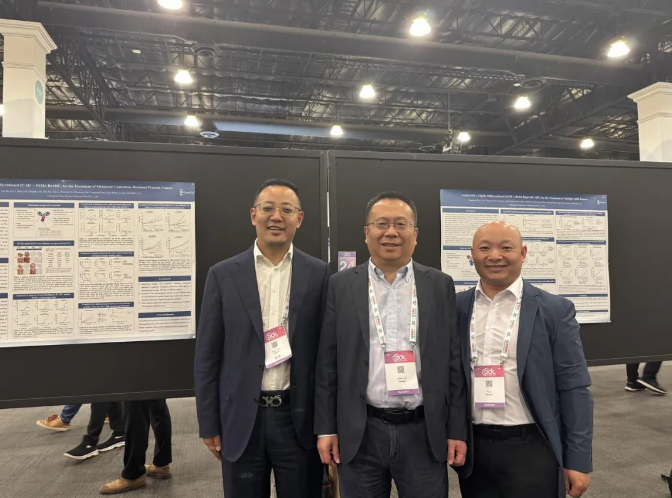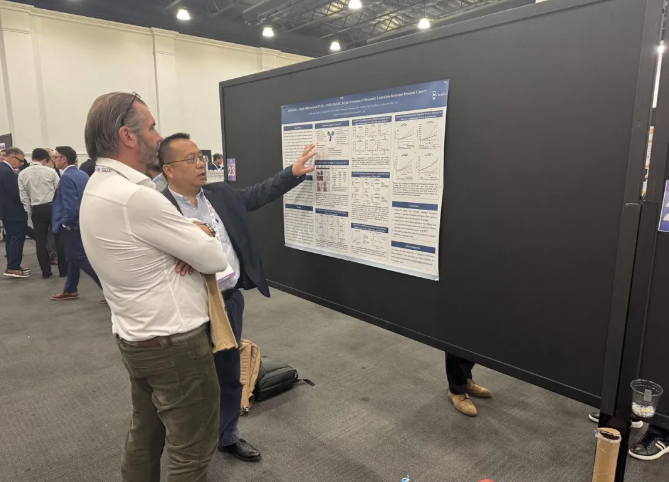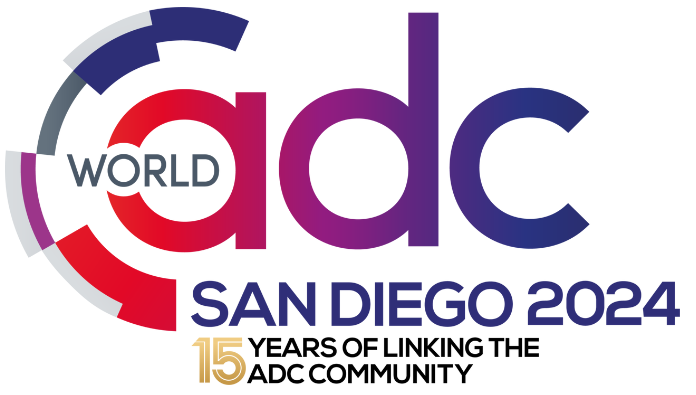World ADC San Diego 2024: GenSci showcases two innovative pipeline programs
Time
2024-11-11
Readership
6124
Share



From November 4th to 7th, the 15th World ADC San Diego 2024—the world's longest-standing and definitive ADC forum—took place at the Town & Country Resort in San Diego, United States. John L. Xu, Executive Vice President of Discovery Research in Immunology and Oncology, and Mr. Li Fu, Senior Director in Oncology at GenSci, presented innovative pipeline programs, GenSci143 and GenSci139, at the conference. They shared scientific and technological advancements with leading experts and scholars in the field of ADCs from Europe, the United States, and Asia. The highlighted pipelines are highly differentiated bispecific ADCs designed for treating metastatic castration-resistant prostate cancer (mCRPC) and various solid tumors.

Representatives of GenSci From left to right: Zhu Gaoming, Vice President of Investment & Business Development; Dr. John L. Xu, Executive Vice President of Discovery Research in Immunology and Oncology; Li Fu, Senior Director of Oncology Research

Dr. John L. Xu introduces innovative R&D projects the visitor
The programs shared are as follows:
GenSci143: a Highly Differentiated B7-H3 × PSMA BsADC
PCa is the most common cancer among men worldwide. Once patients have progressed to castration resistance, treatment options become highly scarce, leaving a substantial unmet need in the mCRPC settings. Both B7-H3 and PSMA are tumor-associated antigens that exhibit high levels of expression in PCa, and dual targeting of them with a single agent represents a promising therapeutic approach to the treatment of mCRPC. We developed GenSci143, a novel B7-H3×PSMA-directed bispecific ADC comprised of a bispecific antibody against B7-H3 and PSMA, a highly stable but cleavable linker, and a potent topoisomerase 1 inhibitor payload. GenSci143, as a novel targeted cancer therapy, is evaluated in preclinical studies. In human CDX models of PCa in mice, GenSci143 effectively induced tumor regression across different expression levels of B7-H3 and PSMA and demonstrated superior anti-tumor efficacy versus the DS-7300 and ARX517 analogs. Moreover, GenSci143 exhibited a favorable pharmacokinetic profile and is well-tolerated in cynomolgus monkeys.
GenSci139: a Highly Differentiated EGFR x HER2 Bispecific ADC
Enhertu®/DS-8201, a HER2-directed ADC, has been widely used for the treatment of multiple tumor types, including HER2-positive and HER2-low breast cancer, HER2-mutant NSCLC, HER2-positive gastric cancer, etc. Despite Enhertu’s success as a breakthrough therapy, a significant unmet need remains in the HER2-low settings and in patients who develop secondary resistance. Dual targeting of EGFR and HER2 represents a promising approach to treating HER2-low patients and overcoming drug resistance, as they are both oncogenic drivers and widely co-expressed. We developed GenSci139, an EGFR x HER2 bispecific ADC with a highly stable but cleavable linker and a potent topoisomerase 1 inhibitor payload, using our own proprietary platform technologies. GenSci139 showed much better in vitro plasma stability than DS-8201, suggesting a favorable PK and safety profile. GenSci139 exhibited stronger in vitro tumor cell binding and internalization activities than DS-8201 and potent direct cytotoxicity and bystander killing effect in tumor cell lines. Furthermore, GenSci139 demonstrated superior in vivo anti-tumor efficacy versus DS-8201 in a number of CDX models in mice. These data suggest the potential of GenSci139 as a novel and effective therapy across a variety of tumor types, including urothelial cancer, lung cancer, gastric cancer, colorectal cancer, ovarian cancer, breast cancer, etc., and support its further evaluation in IND-enabling studies.

World ADC San Diego 2024
Notably, GenSci143 and GenSci139, as the company's highlighted pipeline programs, have been showcased at China's leading life sciences partnering conference, ChinaBio®, and the first R&D Day hosted by GenSci. These events attracted widespread attention from the industry. The innovative pipeline of GenSci covers key disease areas such as oncology, immunology, and endocrinology, including potential First-in-Class (FIC) and Best-in-Class (BIC) innovative drugs. The company's oncology portfolio features ADCs and small-molecule drugs for solid tumors, including prostate, breast, and ovarian cancer, which are likely to be FIC or BIC.
-

 2025-12-16GenSci Secures Up to $1.365B in Global ex-China Licensing Deal for GS-098(YB-101) with RTW Investments
2025-12-16GenSci Secures Up to $1.365B in Global ex-China Licensing Deal for GS-098(YB-101) with RTW Investments -

 2025-09-18GenSci Partners with Allergy Immunotherapy Leader ALK to Bring Innovative AIT Solutions for Chinese Patients
2025-09-18GenSci Partners with Allergy Immunotherapy Leader ALK to Bring Innovative AIT Solutions for Chinese Patients -

 2025-06-18Gensci Showcases Women's Health and Immunology Innovations at BIO 2025
2025-06-18Gensci Showcases Women's Health and Immunology Innovations at BIO 2025





